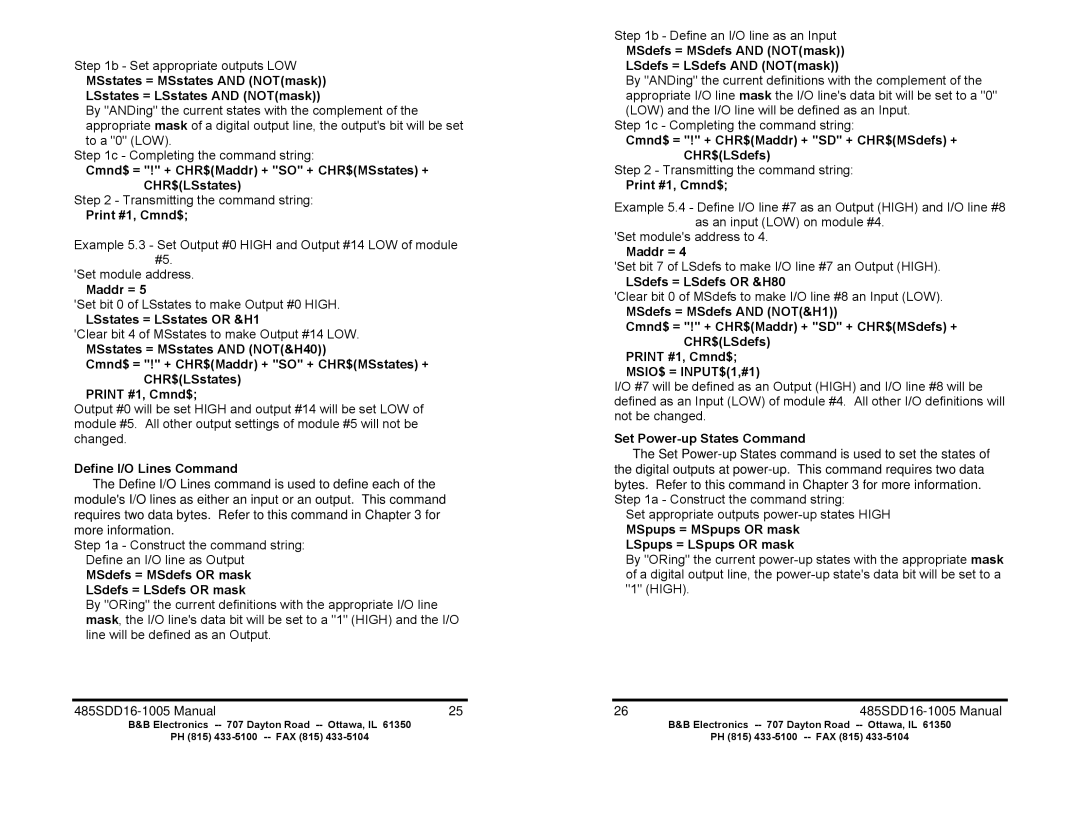Step 1b - Set appropriate outputs LOW
MSstates = MSstates AND (NOT(mask))
LSstates = LSstates AND (NOT(mask))
By "ANDing" the current states with the complement of the appropriate mask of a digital output line, the output's bit will be set to a "0" (LOW).
Step 1c - Completing the command string:
Cmnd$ = "!" + CHR$(Maddr) + "SO" + CHR$(MSstates) + CHR$(LSstates)
Step 2 - Transmitting the command string:
Print #1, Cmnd$;
Example 5.3 - Set Output #0 HIGH and Output #14 LOW of module #5.
'Set module address.
Maddr = 5
'Set bit 0 of LSstates to make Output #0 HIGH.
LSstates = LSstates OR &H1
'Clear bit 4 of MSstates to make Output #14 LOW.
MSstates = MSstates AND (NOT(&H40))
Cmnd$ = "!" + CHR$(Maddr) + "SO" + CHR$(MSstates) +
CHR$(LSstates)
PRINT #1, Cmnd$;
Output #0 will be set HIGH and output #14 will be set LOW of module #5. All other output settings of module #5 will not be changed.
Define I/O Lines Command
The Define I/O Lines command is used to define each of the module's I/O lines as either an input or an output. This command requires two data bytes. Refer to this command in Chapter 3 for more information.
Step 1a - Construct the command string:
Define an I/O line as Output
MSdefs = MSdefs OR mask
LSdefs = LSdefs OR mask
By "ORing" the current definitions with the appropriate I/O line mask, the I/O line's data bit will be set to a "1" (HIGH) and the I/O line will be defined as an Output.
25 |
Step 1b - Define an I/O line as an Input
MSdefs = MSdefs AND (NOT(mask))
LSdefs = LSdefs AND (NOT(mask))
By "ANDing" the current definitions with the complement of the appropriate I/O line mask the I/O line's data bit will be set to a "0" (LOW) and the I/O line will be defined as an Input.
Step 1c - Completing the command string:
Cmnd$ = "!" + CHR$(Maddr) + "SD" + CHR$(MSdefs) + CHR$(LSdefs)
Step 2 - Transmitting the command string:
Print #1, Cmnd$;
Example 5.4 - Define I/O line #7 as an Output (HIGH) and I/O line #8 as an input (LOW) on module #4.
'Set module's address to 4.
Maddr = 4
'Set bit 7 of LSdefs to make I/O line #7 an Output (HIGH).
LSdefs = LSdefs OR &H80
'Clear bit 0 of MSdefs to make I/O line #8 an Input (LOW).
MSdefs = MSdefs AND (NOT(&H1))
Cmnd$ = "!" + CHR$(Maddr) + "SD" + CHR$(MSdefs) +
CHR$(LSdefs)
PRINT #1, Cmnd$;
MSIO$ = INPUT$(1,#1)
I/O #7 will be defined as an Output (HIGH) and I/O line #8 will be defined as an Input (LOW) of module #4. All other I/O definitions will not be changed.
Set Power-up States Command
The Set
bytes. Refer to this command in Chapter 3 for more information. Step 1a - Construct the command string:
Set appropriate outputs
MSpups = MSpups OR mask
LSpups = LSpups OR mask
By "ORing" the current
26 |
B&B Electronics | B&B Electronics |
PH (815) | PH (815) |
